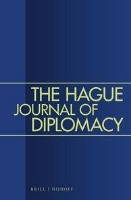
Hague Journal of Diplomacy
Scope & Guideline
Exploring contemporary practices in international relations.
Introduction
Aims and Scopes
- Public Diplomacy:
Focus on the role of public diplomacy in shaping international relations, including the strategies and impacts of states and non-state actors in communicating and engaging with foreign publics. - Digital Diplomacy:
Exploration of how digital technologies are transforming diplomatic practices, including the use of social media, online platforms, and digital communication strategies. - Cultural Diplomacy:
Analysis of cultural exchanges and soft power initiatives as tools for enhancing international cooperation and understanding, particularly in the context of global cultural dynamics. - Gender and Diversity in Diplomacy:
Investigating the representation and roles of various gender identities and minority groups within diplomatic institutions and practices, emphasizing inclusivity and equity. - Climate and Environmental Diplomacy:
Researching the diplomatic efforts related to climate change and environmental issues, focusing on international cooperation and policy-making at global and regional levels. - Historical Perspectives on Diplomacy:
Utilizing historical case studies to understand the evolution of diplomatic practices and their relevance in contemporary international relations. - City and Local Diplomacy:
Examining the role of cities and local actors in global diplomacy, including the impact of municipal twinning and grassroots initiatives on international relations.
Trending and Emerging
- Digital Disruption and Diplomacy:
An increasing focus on how digital technologies disrupt traditional diplomatic practices, with studies examining the implications of digital communication and cyber diplomacy. - Diaspora and Transnational Diplomacy:
Growing attention to the role of diaspora communities in shaping diplomatic relations, emphasizing how transnational ties influence state behavior and public diplomacy. - Intersectionality in Diplomacy:
Emerging research that considers the intersection of various identities in diplomatic contexts, particularly regarding gender, race, and social equity. - Climate Change and Environmental Negotiations:
A rising trend in research related to climate diplomacy, exploring how states and organizations negotiate environmental agreements and address global warming. - Soft Power and Cultural Influence:
An enhanced emphasis on the strategies and impacts of soft power, particularly in relation to cultural diplomacy and its role in international relations. - Space Diplomacy:
An innovative area of focus on diplomacy related to outer space activities, exploring international cooperation, competition, and the governance of space resources.
Declining or Waning
- Traditional State-Centric Diplomacy:
There is a diminishing focus on traditional state-centric models of diplomacy, as the journal increasingly emphasizes non-state actors and informal diplomatic practices. - Cold War Diplomacy:
Research centered on Cold War dynamics is less frequently addressed, possibly due to the historical nature of the subject and the growing relevance of contemporary geopolitical issues. - Bilateral Relations:
Analysis of bilateral diplomatic relations has decreased, with a shift towards more complex multilateral frameworks and global governance discussions. - Military Diplomacy:
Themes focusing on military diplomacy and defense-related aspects of international relations have waned, as the journal leans more towards soft power and cultural dimensions. - Theoretical Frameworks of Diplomacy:
There appears to be a reduction in papers solely dedicated to theoretical frameworks of diplomacy, as practical case studies and empirical research gain more traction.
Similar Journals
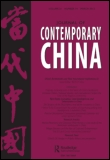
Journal of Contemporary China
Exploring the Dynamics of Modern ChinaJournal of Contemporary China, published by Routledge Journals, Taylor & Francis Ltd, is a prestigious peer-reviewed journal that addresses critical issues concerning contemporary Chinese society, politics, and its role in global dynamics. With an ISSN of 1067-0564 and an E-ISSN of 1469-9400, it stands as a leading platform for scholarly research since its inception in 1992. Recognized for its high impact, the journal ranks in the Q1 category across multiple disciplines including Development and Political Science, showcasing its relevance and influence in shaping discourse around China. As of 2023, it occupies notable positions in Scopus rankings within Social Sciences, placing it in the 91st percentile for Political Science and International Relations. The journal offers an essential resource for researchers, professionals, and students interested in uncovering the complexities of China's evolving landscape, making it a vital reference for academic study and policy formulation.
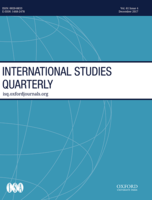
INTERNATIONAL STUDIES QUARTERLY
Navigating the Landscape of Global PoliticsINTERNATIONAL STUDIES QUARTERLY, published by OXFORD UNIVERSITY PRESS, is a premier scholarly journal in the domains of Political Science and International Relations. With an esteemed Q1 ranking in both fields as of 2023, this journal stands out as a significant contributor to the academic discourse on global issues, diplomacy, and the socio-political challenges facing international systems. Covering a spectrum of interdisciplinary research since its inception in 1978, it provides a vital platform for researchers, practitioners, and students alike to engage with contemporary theoretical frameworks and empirical studies. Although it operates under a traditional subscription model, its high visibility in the academic community ensures that it reaches a wide audience. With a Scopus ranking that positions it in the top percentile of its fields, INTERNATIONAL STUDIES QUARTERLY remains essential for anyone seeking to deepen their understanding of the complexities of international relations.
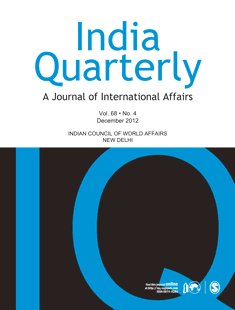
India Quarterly-A Journal of International Affairs
Illuminating India's Path in World AffairsIndia Quarterly-A Journal of International Affairs, published by SAGE PUBLICATIONS INDIA PVT LTD, is a pivotal platform dedicated to the study of international relations and political science, particularly with an emphasis on India’s role in global affairs. Established in 1954, this esteemed journal has been providing comprehensive insights and critical analyses over the decades, with issues that span converged years from 1954 to 1963, from 1966 to 2008, and from 2011 to 2024. Ranked in the Q3 category within the domains of Political Science and International Relations and holding a Scopus rank within the 48th percentile, it serves as a valuable resource for researchers, policymakers, and academicians alike. Though not an open-access journal, its rigorous selection process ensures the dissemination of high-quality research, making it an essential reference for those keen on understanding the complexities of international affairs associated with India. With its base in New Delhi, the journal is committed to fostering scholarly dialogue and advancing knowledge on crucial global issues.
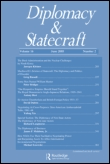
Diplomacy & Statecraft
Decoding the nuances of international relations.Diplomacy & Statecraft, published by Taylor & Francis Inc, is a highly regarded journal in the realms of History, Political Science, and International Relations. Since its inception in 1990, this journal has played a pivotal role in the scholarly exploration of diplomatic practices and their implications for statecraft. With an ISSN of 0959-2296 and an E-ISSN of 1557-301X, it provides a rigorously peer-reviewed platform for academics and practitioners aiming to contribute to the understanding of global politics. Although not an Open Access journal, it maintains a commendable impact, evidenced by its Scopus rankings—positioned in the 69th percentile for History and engaging discussions on significant political themes. Its importance is underscored by its recent categorization in Q3 and Q4 quartiles, making it a critical resource for researchers and students interested in the complex dynamics of diplomacy and international relations. With a commitment to publishing compelling and insightful articles, Diplomacy & Statecraft continues to foster academic dialogue and enrich our understanding of the strategic maneuvers that shape our world.
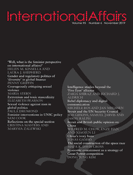
INTERNATIONAL AFFAIRS
Championing Rigorous Scholarship in International RelationsINTERNATIONAL AFFAIRS, published by OXFORD UNIVERSITY PRESS, stands as a premier journal in the fields of political science and international relations, boasting an impressive Impact Factor and a reputation for rigorous scholarship. Established in the United Kingdom, the journal's ISSN is 0020-5850 and its E-ISSN is 1468-2346. From its inception to the present, it has played a crucial role in analyzing and interpreting global issues that shape our world, with a notable mention of its Q1 quartile ranking in both Political Science and Sociology according to 2023 metrics. Researchers and practitioners alike benefit from its high-quality, peer-reviewed articles, which consistently rank it in the top percentile of its category, underscoring its significance in contemporary discourse. As the journal continues to evolve, it remains a vital resource for those looking to deepen their understanding of international affairs and sociopolitical dynamics.
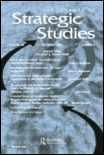
JOURNAL OF STRATEGIC STUDIES
Advancing the Frontiers of Strategic ThoughtJOURNAL OF STRATEGIC STUDIES is a premier academic journal dedicated to the fields of political science and international relations, published by Routledge Journals, Taylor & Francis Ltd. Established in 1978, this journal has built a strong reputation for disseminating high-quality research and theoretical contributions that drive innovation and scholarship in strategic studies. With a commendable impact factor that places it in the Q1 quartile for Political Science and International Relations, and Q2 quartile for Sociology and Political Science, the journal ranks among the top publications with notable Scopus rankings that reflect its influence and reach. The journal’s comprehensive scope encompasses a wide array of topics, from security studies to diplomacy, making it an invaluable resource for researchers, professionals, and students alike. Although it operates on a subscription-based access model, the journal's commitment to advancing knowledge in strategic studies ensures that it remains a vital platform for scholarly dialogue and exploration. Join the community of scholars contributing to cutting-edge research through this leading journal.
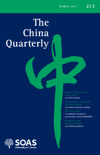
CHINA QUARTERLY
Illuminating China's Socio-Economic Landscape for Global UnderstandingCHINA QUARTERLY, an esteemed journal published by Cambridge University Press, serves as a leading platform for scholarly discourse in the fields of Development, Geography, Planning and Development, and Political Science and International Relations. With a strong reputation evidenced by its Q1 ranking in multiple categories and indexed since 1960, it attracts a diverse array of research focusing on the socio-economic and political dynamics within China and its impact on global affairs. The journal's rigorous peer-review process ensures the publication of high-quality articles that contribute meaningfully to contemporary debates and theoretical advancements. Although not open access, CHINA QUARTERLY offers extensive research opportunities for scholars, professionals, and students keen on exploring and understanding the intricate layers of China’s development and its global relations. Its dedicated address in Cambridge, United Kingdom underscores its commitment to fostering international dialogue and academic collaboration.

Istoriya-Elektronnyi Nauchno-Obrazovatelnyi Zhurnal
Unlocking the Past: A Gateway to Interdisciplinary ScholarshipIstoriya-Elektronnyi Nauchno-Obrazovatelnyi Zhurnal, with ISSN 2079-8784, is a prominent academic journal published by the STATE ACAD UNIV HUMANITIES in the Russian Federation. This interdisciplinary journal, focusing on various aspects of history, sociology, visual arts, and the philosophy of science, is available through open access, providing an invaluable resource for scholars and students alike. Since its inception in 2018, it has successfully garnered significant attention, highlighted by its impressive quartile rankings in fields such as History (Q2) and Visual Arts (Q1) in 2023. Despite varying Scopus rankings, the journal upholds its commitment to advancing knowledge and fostering academic dialogue within its scope. The journal not only aims to contribute to the scholarly discourse but also to facilitate the dissemination of research findings across borders, making it a vital platform for those engaged in the humanities. Researchers and practitioners can access rich insights and contemporary discussions, making Istoriya a must-read for anyone interested in these dynamic fields.
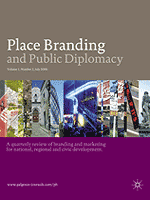
Place Branding and Public Diplomacy
Transforming Perceptions with Strategic Branding InsightsPlace Branding and Public Diplomacy is a prominent academic journal published by Palgrave Macmillan Ltd, focusing on the intersection of place branding, public diplomacy, and strategic management. With an ISSN of 1751-8040 and an E-ISSN of 1751-8059, this esteemed journal has been contributing to the fields of Marketing and Strategy and Management since its inception in 2008. As of 2023, it is ranked Q3 in both categories within Scopus, highlighting its relevance and influence in contemporary research, reflected by its positions at #219 in Strategy and Management and #110 in Marketing. This journal aims to provide a platform for innovative research that enhances understanding of how place branding and public diplomacy can shape perceptions and foster engagement in a globalized world. While it does not offer open access, it serves as a valuable resource for academics, practitioners, and students interested in exploring the dynamics of place identity and strategic communication in the context of international relations.

INTERNASJONAL POLITIKK
Fostering Insightful Dialogues on Global IssuesINTERNASJONAL POLITIKK is a prominent peer-reviewed journal published by the Norsk Utenrikspolitisk Institutt in Norway, focusing on the multifaceted domains of Political Science and International Relations. With an ISSN of 0020-577X and an E-ISSN of 1891-1757, this journal has transitioned to an Open Access format since 2016, facilitating broader access to vital research. It is noted for its critical analyses and explorations of contemporary international issues, aiming to bridge academic research and public policy debates. Given its ranking in the Q3 category for both Political Science and Sociology and Political Science, as reported in 2023, the journal has carved out a significant niche among scholars and practitioners alike. Researchers are encouraged to contribute their findings and insights as the journal continues to serve as a platform for thought-provoking discourse, especially in a rapidly changing global landscape.